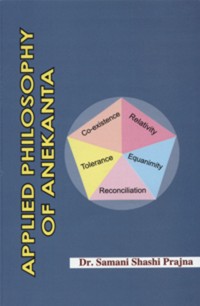Change and permanence is the nature of reality. Anekānta accepts the co-existence of both the opposites as a fact. Nothing in this world is without limits. Everything has its limits. There is a need for equanimity. Loss and gain, both are to be accepted. It is the norm of life that if there is gain, there will also be loss and vice-versa or the other way round. The two are not distanced; they are mutually connected and go together. Gain is linked to loss and loss to gain. The two are one. The difference is only in time and space. There is no distance between happiness and sorrow. There is no distance between life and death. They both go together. Sometimes one feels happy and life seems bright and sometimes one feels sad and life seems miserable. It is a single chain. The wheels bring in water, empty it and return. The Wheels full of water and empty of water keep coming and going. They work together. Life and death work together. There is no second that belongs entirely to life or entirely to death. The first second of life is also the first second of death. Death is not an event, which takes place after 70-80 years. It can take place even in the first second. With the first second of birth, the event of death also takes place. The one, who does not die in the first second will become immortal, he will never die. The one who is not born in the first second cannot be created in the next. Every object experiences birth every second. Creation and destruction go hand in hand. One cannot find even one man who has been only praised, never condemned or always condemned and never praised. Both go together. The balance is maintained.
The problem arises when one doesn’t identify oneself with the problem. If there is emotional distance from the problem, then one will be able to maintain one’s equanimity in tough situations. This is a good way to tackle the problems. But man is strange. They want gain, but not loss, they want joy, but not sorrow, they want life, but not ready to accept death and wish to be praised, never condemnation. They then forget the universal rule. In this dualistic world, nothing comes alone. Everything is in pairs. Man is ignorant. He wants to break the order of anekāntic nature of Reality and wants only a single dimension and through such one-sided perspective, one cannot lead a life of equanimity. Now we will proceed towards the detailed implications of Philosophy of Co-existence. The Philosophy of co-existence as propounded by Mahapragya has its roots in the Jain āgam-s. Thāṇam, Nandī and Daśavaikālika Sūtras have the description of opposite couplets in plenty. Some of them are as follows:dharmāstikāya-adharmāstikāya, loka-aloka,bandha-moksha,puṇya-pāpa,āshrava-saµvara, jiva-ajiva, trus-sthāvar, dharma-adharma, vedanā-nirjarā etc.[1] Similar seven pairs are mentioned in Nandī Sūtra of ‘shrut gyan’.[2] In the Dasavaikālika Sūtra,[3] the four key emotions, Anger, Ego, Affection and Greed are prominently discussed. Sūtra states that these emotions co-exist with the contrasting feelings. Anger can be diluted by forgiveness and Ego with humility. Affection too, is a kind of bondage and can be countered by equanimity. Greed can be overcome is that the opposites coexist.
 Dr. Samani Shashi Pragya
Dr. Samani Shashi Pragya

